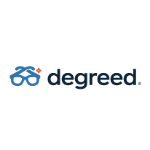Description

Degreed

Trainual
Comprehensive Overview: Degreed vs Trainual
Degreed and Trainual are two platforms within the learning and development space, each catering to different market needs and offering unique functionalities. Here's a comprehensive overview of both:
a) Primary Functions and Target Markets
Degreed:
- Primary Functions: Degreed is a comprehensive learning experience platform (LXP) that aggregates educational content across various mediums, such as courses, videos, articles, books, and podcasts. It provides users with the ability to manage, track, and recognize all types of learning, whether formal or informal. Key features include skills measurement, learning paths, reporting capabilities, and integration with external learning management systems (LMS) and content providers.
- Target Markets: Degreed primarily targets enterprise clients looking for an all-encompassing platform to manage employee learning and development. This includes large corporations and organizations that require a robust solution to track, analyze, and enhance the skills and capabilities of their workforce on a global scale.
Trainual:
- Primary Functions: Trainual focuses on providing small to medium-sized businesses (SMBs) with tools to create, document, and train their teams on processes and procedures. It's essentially an operations manual built for scalability, offering features like role-based training, process automation, and custom onboarding programs. Trainual emphasizes ease of use for standard operating procedures (SOPs) creation and training content.
- Target Markets: Trainual primarily targets SMBs, startups, and rapidly growing businesses that need a scalable solution for training, onboarding, and process documentation. The platform is designed to help smaller teams quickly implement and update training content.
b) Market Share and User Base
Degreed:
- Degreed serves a wide array of large enterprises and has positioned itself as a leader in the learning experience platform market. While specific market share data can be difficult to obtain, Degreed is one of the more recognized names in the LXP space and boasts a substantial user base among Fortune 500 companies.
Trainual:
- Trainual, being targeted at SMBs, has a substantial presence in the small business sector but doesn't cater to enterprises at the same scale as Degreed. Trainual has gained traction in its niche market, particularly due to its focus on simplicity and efficiency for smaller teams.
c) Key Differentiating Factors
-
Target Audience and Scale:
- Degreed is catered towards large enterprise clients needing a comprehensive solution, whereas Trainual targets smaller businesses requiring quick, efficient training and process documentation tools.
-
Functionality and Features:
- Degreed offers an extensive suite of features including skills tracking, content aggregation from multiple sources, and detailed analytics, making it suitable for comprehensive corporate learning strategies.
- Trainual provides straightforward, role-based training, and process documentation tools, emphasizing ease of use and speedy implementation.
-
Integration Capabilities:
- Degreed seamlessly integrates with numerous LMSs and content providers, making it versatile for companies already using other learning solutions.
- Trainual offers integrations with popular business tools relevant to SMBs, but focuses more on internal knowledge sharing rather than extensive integrations with external content providers.
-
Cost and Accessibility:
- Degreed, catering to larger enterprises, often comes with higher implementation and subscription costs reflecting its broad functionality.
- Trainual offers pricing models that are typically more accessible to SMBs and startups, focusing on affordability and ease of setup.
-
Learning Content:
- Degreed acts as a gateway to diverse types of content across different platforms, supporting holistic learning experiences.
- Trainual is more focused on creating and managing proprietary company content internally.
In conclusion, while Degreed and Trainual operate within the same broad market of learning and development, they serve distinct needs. Degreed is suitable for large-scale integrated learning environments, while Trainual is ideal for process-oriented training geared towards smaller operations.
Contact Info

Year founded :
2012
+1 800-311-7061
Not Available
United States
http://www.linkedin.com/company/degreed

Year founded :
2018
Not Available
Not Available
United States
http://www.linkedin.com/company/trainuals-sadcs2
Feature Similarity Breakdown: Degreed, Trainual
a) Core Features in Common:
Both Degreed and Trainual are platforms focused on learning and development, but they approach it from slightly different angles. Here are some core features they have in common:
-
Content Creation and Management:
- Both platforms allow businesses to create, organize, and manage training content. This includes uploading content and creating courses or learning modules.
-
User Management:
- They provide tools for managing users, including adding and removing users, setting permissions, and organizing users into groups or teams.
-
Assessment and Quizzes:
- Both platforms offer the ability to create assessments and quizzes to test user knowledge and track learning progress.
-
Analytics and Reporting:
- They both offer analytics and reporting features, allowing administrators to track the progress of learners and gain insights into content effectiveness.
-
Integration Capabilities:
- Both Degreed and Trainual can integrate with other systems and tools, such as HR systems, learning management systems (LMS), and other business productivity tools.
b) User Interfaces Comparison:
-
Degreed:
- Degreed has a sleek, modern interface designed for a broad learning experience. It emphasizes discovery and social learning, with features like a comprehensive homepage feed for personalized learning suggestions, a catalog of knowledge across various platforms, and dedicated sections for pathways and skill development.
- The UI is often praised for its intuitive navigation, especially when managing personalized learning paths or exploring content from diverse sources.
-
Trainual:
- Trainual’s interface is clean and straightforward, focusing on step-by-step guides and standard operating procedures. It’s designed to be accessible for users who need to quickly create and follow standard training modules or business processes.
- The UI is particularly effective for small and medium businesses looking to streamline onboarding and training with minimal complexity involved.
c) Unique Features:
-
Degreed:
- Skill Certification and Development: Degreed focuses heavily on skill development, offering tools for tracking skill acquisition and providing resources for users to upskill. It supports skill assessments and matches users with learning experiences tailored to their skill gaps.
- Learning Pathways: Degreed supports the creation of customized learning pathways that guide users through a sequence of learning experiences aimed at developing specific skills or competencies.
- Cross-Platform Content: Degreed aggregates content from multiple sources, including courses, articles, videos, and podcasts, to offer users a diverse learning ecosystem.
-
Trainual:
- Process Documentation: Trainual specializes in process documentation and SOP creation, making it an excellent choice for businesses that need to formalize workflows and operational procedures.
- Customizable Templates: Trainual offers an array of ready-to-use templates that employees and managers can customize to fit specific business needs, which helps in creating quick and efficient training content.
- Role-based Access: It supports detailed role-based access controls, allowing businesses to assign content and training modules based on user roles or job functions, ensuring employees see relevant content only.
In summary, while both tools serve the purpose of providing training and development opportunities, Degreed is particularly strong in skills development and content aggregation across different media. In contrast, Trainual stands out in process documentation and operational training, offering structured and simplified content creation for businesses.
Features

User-Friendly Learning Experience
Diverse Content Integration
Community and Collaboration
Robust Analytics and Reporting

Team Knowledge Sharing
Compliance and Consistency
Documenting Processes
Onboarding New Employees
Best Fit Use Cases: Degreed, Trainual
Degreed and Trainual are both online learning platforms focused on improving employee training and development, but they cater to different needs and use cases within organizations.
Degreed
a) Best Fit Use Cases
-
Large Enterprises and Corporations: Degreed is often the best choice for large enterprises and corporations that require a comprehensive learning and upskilling platform. Its strength lies in providing a robust, scalable solution that can handle diverse learning pathways and skills assessments.
-
Continuous Learning and Development Programs: Companies aiming to promote lifelong learning and a culture of continuous skill development benefit from Degreed's extensive content library and integration capabilities.
-
Industry-Specific Skill Development: It is suitable for industries like tech, finance, healthcare, and other knowledge-intensive fields where there is a need for ongoing professional development to keep up with rapidly evolving industry standards.
b) Industry Vertical and Company Size Catered To
- Degreed is well-suited for medium to large enterprises across various verticals, especially those focused on complex skill development. It caters to industries such as IT, finance, healthcare, and education, providing tools to track, measure, and improve skills at scale.
Trainual
b) Preferred Use Cases
-
Small to Medium-Sized Businesses (SMBs): Trainual is ideal for SMBs, startups, and growing companies that require a straightforward and scalable solution for onboarding and process documentation.
-
Standard Operating Procedures (SOPs) and Training: It excels in scenarios where businesses need to create, store, and share their SOPs, policies, and team knowledge quickly and efficiently.
-
Franchises and Multi-location Businesses: Trainual is beneficial for businesses with multiple locations or franchises needing consistency in training and operations across different sites.
d) Industry Vertical and Company Size Catered To
- Trainual is mainly targeted towards small to midsize businesses across various sectors like retail, hospitality, food services, and professional services. It's particularly useful for organizations that prioritize streamlined onboarding processes and centralizing company knowledge effectively.
Comparison Summary:
- Degreed is better suited for larger organizations that require robust skill tracking and development tools across various verticals, often those needing sophisticated learning pathways and integrations.
- Trainual targets smaller businesses and franchises that focus on ease of documentation and rapid onboarding, helping standardize processes and improve operational efficiency.
Pricing

Pricing Not Available

Pricing Not Available
Metrics History
Metrics History
Comparing teamSize across companies
Conclusion & Final Verdict: Degreed vs Trainual
To provide a comprehensive conclusion and final verdict for Degreed and Trainual, it's essential to consider the overall value each platform offers, their pros and cons, and specific recommendations for potential users.
Conclusion and Final Verdict
Overall Value:
-
Degreed is an excellent choice for organizations looking for a comprehensive learning platform that emphasizes skill development and continuous learning. It's particularly valuable for companies that prioritize upskilling, employee growth, and resource aggregation from various content providers.
-
Trainual is best suited for small to medium-sized businesses focused on documenting processes, standard operating procedures (SOPs), and ensuring consistent training across teams. It offers significant value for its ease of use, quick deployment, and focus on operational efficiency.
Considering all factors, the best overall value depends on the specific needs of the organization. For continuous learning and skill development at scale, Degreed is more appropriate. For process documentation and training consistency in smaller teams, Trainual offers better value.
Pros and Cons
Degreed:
-
Pros:
- Comprehensive learning ecosystem integrating multiple learning resources.
- Strong focus on skill tracking and personal development.
- Robust analytics to measure learning impact and skill progress.
- Integrates with a wide variety of content providers and tools.
-
Cons:
- Can be complex to set up and manage, especially for smaller organizations.
- Higher costs, potentially putting it out of reach for smaller businesses.
- May require a cultural shift toward self-directed learning.
Trainual:
-
Pros:
- User-friendly interface with easy setup and management.
- Excellent for SOPs, policy documentation, and team-specific training.
- Cost-effective for small to medium-sized companies.
- Offers customizability to tailor training processes for specific needs.
-
Cons:
- Limited focus on broader learning beyond company-specific training.
- Less suitable for larger enterprises looking for extensive upskilling features.
- Lacks the depth of external learning content integration seen in Degreed.
Recommendations for Users
-
Consider Business Size and Objectives: Small to medium-sized businesses focused on streamlining operations and ensuring consistent training might prefer Trainual due to its ease of use and process-driven approach. Larger organizations or those that view learning as a continuous, skills-based effort may find Degreed more aligned with their goals.
-
Evaluate Learning Needs: If the primary need is skill development, continuous learning, and integration with a variety of learning resources, Degreed will be more beneficial. For companies aiming to document processes and onboard new employees efficiently, Trainual is likely the better option.
-
Cost and Resource Assessment: Organizations should consider their budget and learning management resources. Degreed's powerful capabilities often come with higher costs and complexity, while Trainual is more economical and straightforward for immediate deployment.
-
Trial and Feedback: It's beneficial to trial both platforms, if possible, gathering feedback from end-users on usability and effectiveness in meeting training goals.
In summary, the decision between Degreed and Trainual should align with the company's size, learning objectives, and resource availability, ensuring the choice enhances organizational learning and operational efficiency.
Add to compare
Add similar companies



